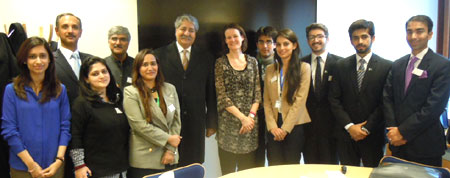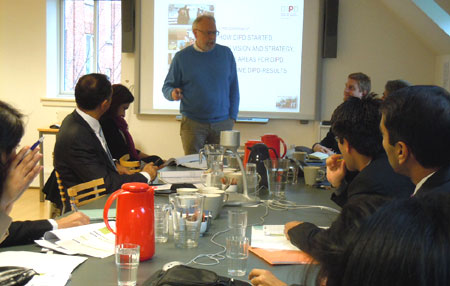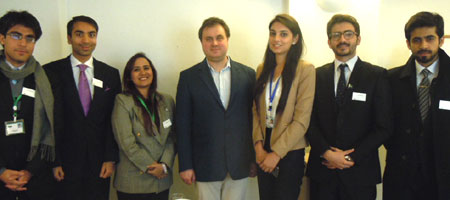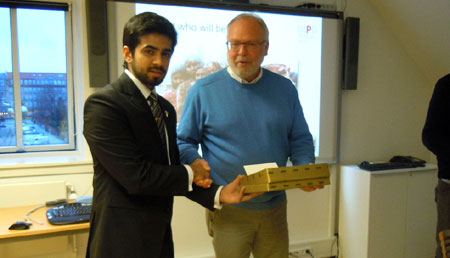|
|
| |
| EVENTS |
|
|
> Pakistan Delegation kick-starts Study Visit in Copenhagen with Briefings on Danish Democracy and Electoral System
|
| |
|
Study Visit to UK and Denmark
February 26, 2015
Copenhagen
|
|
| |
Copenhagen, February 24; Pakistan delegation consisting Members of National Assembly and the Youth Parliament Pakistan began the Study Visit in Copenhagen, Denmark with briefings on the development of the Danish political system, Danish democracy and the Danish electoral system. |
|
| |
In an Introduction to Danish Democracy and Political System, Mr. Flemming Juul Ph.D, Lecturer in Political Science at the Roskilde University Centre, shared with the Pakistan delegation the origins and landmark developments that led to the creation of contemporary Danish democracy. The handing over of national decision making power, first by replacing the nobility by talented people in the courts, and later by appointment of an elected body of advisors to rule in lieu of the King in 1848 led to the adoption of Denmark�s Constitution in 1849. After this, the Danish Constitution has had two major amendments; the first granting women to vote in 1915 and the marking the move from the bi-cameral to uni-cameral legislature in 1953. A referendum of the general population in which 40% of the electorate need to vote in favour of a Constitutional amendment, is needed to amend the Danish Constitution. Through an interactive discussion he further highlighted the peculiar role of the Church which is in fact a state institution with priests serving as public servants. Local and Regional Governments handle education, care for the elderly and health care in line with the Danish social welfare model. He pointed out that with an aging population, the Danish government is attempting to raise the retirement age and lower the age at which young people may start earing, thereby decreasing the overall percentage of the dependent population. The rate of income tax for higher income groups in Denmark can go upto 60%, while it may be 40% for middle income groups, he added.
|
|
| |
The Delegation met with the Chief Electoral Officer Ms. Nicoline Miller, who highlighted the working of the peculiar election process in Denmark and said that the elections get approved after 12 days when �Folketing�- the Danish Parliament sits and accepts the elections. The local municipalities train their polling officers who are members of local political parties not contesting a seat in the elections. Ms. Miller explained, if a political party succeeds to get 1000 votes during one election, that particular party gets eligible to avail financial support from the Danish Government. In the Danish electoral process, apart from the 135 constituency seats distributed among the ten multi-member constituencies, 40 seats are distributed among the three provinces. These seats are distributed proportionally before the election every 5 years as sum of population, number of registered voters and the area measured in terms of population density. After the elections, these 40 seats are further distributed among the 10 multi- member constituencies, within the provinces where they were first allocated. Elaborating on the electoral process in Denmark further, Ms. Miller specifically mentioned that any voter could complain over the elections. The complaints are addressed to the Danish Parliament and sent to the Ministry of Economic Affairs and Interior for processing. The �Folketing� decides on the complaints in a meeting of the provisional committee for the scrutiny of Elections. Talking about the e-voting introduction in the Danish electoral process, Ms. Miller highlighted that the usage of electronic machine is discouraged politically because of lack of security and privacy concerns apart from the machine being expensive. Responding to a question on election rigging and malpractices, Ms. Miller said if a person tries to hinder or distort free and fair elections is penalised by imprisonment for up to six years. The same penalty applies to all actions taken concerning other statutory polling, referendum etc. in public affairs.
|
|
| |
In a meeting with the Danish Institute of Parties and Democracy (DPID), the delegation was briefed by the working of the DPID by Mr. Bjorn Forde, Director, Danish Institute of Political Parties and Democracy (DIPD). Explaining the role of DIPD in bringing �the Danish way� of Democracy to developing democracies, Mr. Forde said that the body exists as autonomous and independent institution. The Board of Directors (BoD) is of 15 members for a period of four years, who makes decisions on all partnerships. The vision of DIPD includes democracy with development rather than waiting for countries to attain developmental maturity and then creating a democratic system. This aim is carried out by facilitating increasing accountability and increasing political participation and representation by facilitating the role played by indigenous political parties. The DIPD is currently carrying out extensive programmes of capacity development and funding in Myanmar, Nepal and Bhutan.
|
|
| |
Earlier during the day, Ms. Maya Lindberg Brink, Capacity Development Advisor, the DANIDA Fellowship Centre (DFC), spoke to the delegation about the work of the DFC through the Capacity Development Programme and Strategic Framework for Danish Support to Development Research. This was followed with a discussion on role of DANIDA as an autonomous public sector organization that works on the development aims of the Danish foreign policy. The DANIDA is funded through the 0.7% of the Danish Gross National Product that was committed to working for the United Nation�s Millennium Development Goals. The Danish-Arab Partnership programme was quoted as an example of one of the new projects that aims for capacity building as well as diplomatic cooperation.
|
|
| |
The Pakistan delegation includes six Members of Youth Parliament Pakistan and two Members of the National Assembly of Pakistan. The four-day Study Visit programme in Copenhagen includes meetings with Danish MPs and experts covering: An Introduction to Danish Democracy, Danish Parliament: National Decision and Policy Making; Danish Multi-culturismand Youth Participation; and Local Governance and Local Democracy.
|
|
| |
Pakistan Delegation includes Honourable Syed Naveed Qamar, MNA (NA-222, Hyderabad, Sindh, PPPP), Chairman National Assembly Standing Committee on Railways, Honourable Mr. Omar Ayub Khan, MNA (NA-19, Haripur, KP, PML-N), Chairman National Assembly Standing Committee on Finance, Revenue, Mr. Aqeel Ahmed Yousafzai, Youth Prime Minister, Mr. Muhammad Shahzar lahi, Youth Leader of the Opposition, Mr. Sohaib Saeed, Chairperson Youth Parliament Standing Committee on Economic and Finance Affairs, Mr. Ali Shan Khan, Youth Shadow Minister for Foreign Affairs, Syeda Mizghan Mehboob Kirmani, Chairperson Youth Parliament Standing Committee on Education & Youth Affairs and Ms. Rahy Farooq, Member Youth Parliament Standing Committee on Education & Youth Affairs.
|
|
| |
The Study Visit to UK is funded by DANIDA, the Royal Danish Embassy, Islamabad and has been organized by the DFC in Copenhagen.
|
|
| |
|
|
| |
|
|
| |

|
|
| |
|
|
| |

|
|
| |
|
|
| |

|
|
| |
|
|
| |

|
|
|
|
|
|
|
|
|